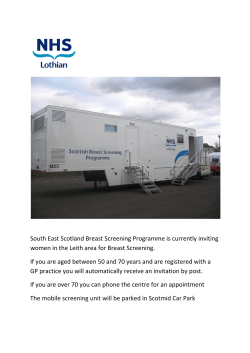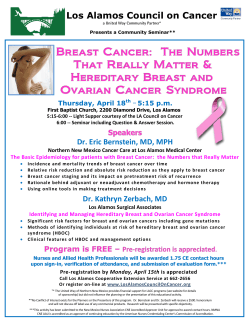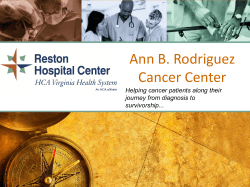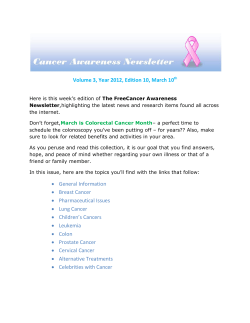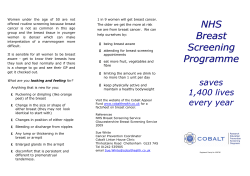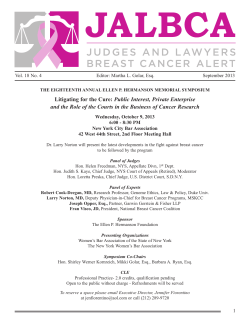
Breast cancer during pregnancy Factsheet
Breast cancer during pregnancy Factsheet This factsheet is for women who have been diagnosed with breast cancer during pregnancy or within a year of delivering their baby. 02 | Introduction Breast cancer during pregnancy | 03 Breast cancer during pregnancy is rare and women can often feel isolated. We hope this factsheet answers some of your questions and helps you to discuss your treatment options and other issues that are important to you and your family with your specialist team. We recommend that you read it together with our Treating breast cancer booklet. You may also find it useful to read our Younger women with breast cancer booklet that covers specific issues for pre-menopausal women with breast cancer. If it has not been possible to get a definite diagnosis using either an FNA or core biopsy it may be necessary to have an operation to enable more tissue to be taken. This can be done under a local or general anaesthetic and is called an excision biopsy. If you have delivered the baby and are breastfeeding you may be given a drug before surgery to stop your breasts producing milk. This reduces the risk of infection. If you do continue to produce milk, you will need to express both before and after surgery. Your specialist team will tell you when it is possible to start breastfeeding again after the operation, if you choose to continue breastfeeding. How is breast cancer in pregnancy diagnosed? What are my treatment options during pregnancy? Breast cancer is normally diagnosed by a method known as ‘triple assessment’ carried out at a specialist breast clinic. You can find out more about this in our Referral to a breast clinic leaflet. Your specialist team will include cancer specialists and an obstetrician (a pregnancy and childbirth doctor). Effective treatment can be given during pregnancy and your team will want to discuss your options fully with you. Generally, the treatment you are offered will depend on the type and extent of your breast cancer, the trimester of your pregnancy when the cancer is diagnosed and your individual circumstances. The first part of this assessment is a breast examination performed by a specialist at the clinic. You will then usually be offered an ultrasound scan (creating a picture of the breast using sound waves) which will help make a diagnosis. This is completely safe and will not affect your pregnancy in any way. You may also be offered a mammogram (breast x-ray). If this is the case, shielding can be used to protect the pregnancy from radiation. An MRI (magnetic resonance imaging) scan of the breast is usually not recommended for pregnant women while in the first trimester. (Each trimester of pregnancy represents a number of weeks, the first is from conception to 12 weeks, the second is 13–28 weeks and the third is from 28 weeks to delivery). The final part of the triple assessment includes a fine needle aspiration (FNA), where cells are drawn off using a syringe and a fine needle, and/or a core biopsy (using a larger needle to take a small sample of tissue). Core biopsies are more commonly used for pregnant women, but both these tests are safe for you and your baby. Bruising to the breast is common after a biopsy because of the increased blood supply to the breast at this time. Visit www.breastcancercare.org.uk Continuing your pregnancy Depending on the trimester, you may need to think about whether or not to continue your pregnancy. The decision to terminate a pregnancy is a very personal one. It can be made only by you, or you and your partner if you have one, following a discussion with your specialist team and obstetrician. It’s important to remember you won’t be judged on your decision. There is no evidence to suggest that a termination will improve the outcome for women diagnosed with breast cancer during pregnancy. However, a termination may be discussed if chemotherapy is recommended during the first trimester (for example, if the breast cancer is the type that can grow more rapidly or has spread to other parts of the body). Whatever you decide, it is important to make the right choice for you. Call our helpline on 0808 800 6000 04 | Can breast cancer during pregnancy affect the baby? Can breast cancer during pregnancy affect the baby? There is no evidence that having breast cancer during pregnancy affects your baby’s development in the womb. You cannot pass cancer on to your baby and there is no evidence that your child will develop cancer in later life as a result of you having breast cancer while pregnant. Is breast cancer during pregnancy more aggressive? There is no conclusive evidence that breast cancer during pregnancy is more aggressive than breast cancer occurring at other times. However, for some women there may be a delay in diagnosis because of the difficulty of detecting a cancer in the breast at this time. Treatment during pregnancy and after delivery The following are treatments that you may be given depending on your trimester and whether you have delivered your baby. If you are near the end of your pregnancy, your specialist team may decide to delay treatment until after the birth. If you are breastfeeding you will be advised to stop before receiving any treatment. Surgery Many women with breast cancer are given a choice between mastectomy and breast-conserving surgery. A mastectomy is removal of the whole breast; breast-conserving surgery can range from lumpectomy or wide local excision (where the tumour is removed with a small amount of surrounding tissue) to quadrantectomy (where approximately a quarter of the breast is removed). Visit www.breastcancercare.org.uk Breast cancer during pregnancy | 05 During pregnancy you are more likely to be offered a mastectomy. This is because after breast-conserving surgery radiotherapy is needed and this cannot be given while you are pregnant. If breast-conserving surgery is considered an option in your case, this may be possible during your third trimester, as radiotherapy can then be given after the baby is born. Due to changes in the breasts during pregnancy, and also to avoid a long time under anaesthetic, breast reconstruction will generally be offered at a later date rather than at the same time as a mastectomy. If you are diagnosed in your second trimester and will be having chemotherapy after your surgery, you may also be able to have breast-conserving surgery (if appropriate) instead of a mastectomy. This is because radiotherapy will not usually be given until after your chemotherapy treatment has finished, and after your baby has been born. It is usually recommended that the lymph nodes in the armpit are checked before surgery. Knowing whether the lymph nodes are affected by the cancer is important in deciding on additional treatments to surgery. The lymph nodes will be checked using an ultrasound scan of this area. If any abnormal nodes are identified a fine needle aspiration will be taken and the sample sent to the laboratory to be looked at under a microscope. After this your doctor will suggest what type of surgery will be most appropriate, either lymph node sampling (removing some of the nodes) or lymph node clearance (removing all of them). Sentinel node biopsy is a form of lymph node sampling. It is a way of detecting whether cancer has spread to the lymph nodes and can be done at the same time as your breast surgery. This technique uses radioactive material and coloured dye to identify the first – or ‘sentinel’ – node to receive lymph fluid from the cancer. If this node is clear it usually means that the other nodes are clear too. The clinical evidence for the safety of radioactive material and coloured dye in pregnancy is very limited. Your surgeon will discuss whether this is a suitable option for you. Call our helpline on 0808 800 6000 06 | Treatment during pregnancy and after delivery Lymph node assessment, sampling and clearance, and surgery for breast cancer are explained in more detail in our Treating breast cancer booklet. Breast cancer during pregnancy | 07 Hormone therapy Whichever type of surgery you have, it will involve having a general anaesthetic. This is generally considered safe to have while you are pregnant although there is a potential slight increase in the risk of miscarriage associated with it, especially early on in the pregnancy. If your breast cancer is hormone receptor positive (which means oestrogen stimulates the cells to grow) you may be offered hormone therapy. The most commonly prescribed hormone therapies for pregnant women diagnosed with breast cancer are tamoxifen and zoladex. These are not given during pregnancy or while breastfeeding although can be given after this time. You can find out more about these hormone therapies in our series of drug factsheets. Chemotherapy Targeted cancer therapies Certain combinations of chemotherapy can be given during pregnancy. However, it should be avoided during the first trimester as it may cause harm to the unborn baby or cause miscarriage. Generally, chemotherapy during the second and third trimesters is safe. Most women treated during this time go on to have healthy babies, although there is some evidence to suggest a small increase in the risk of low birth weight and early delivery. This is the name of a group of drugs that block the ways in which cancer cells grow and spread. The most well known targeted therapy at the moment is Herceptin (trastuzumab), which may be used to treat breast cancers that are HER2 positive. Herceptin is not usually given during pregnancy and breastfeeding is not recommended while having Herceptin or within six months of the last dose. For more information about this treatment see our Herceptin (trastuzumab) factsheet. Breastfeeding should be avoided while undergoing chemotherapy as some chemotherapy drugs are passed through the blood stream into the breast milk. For more general information see our Chemotherapy for breast cancer booklet. Radiotherapy Radiotherapy is not recommended at any stage of pregnancy, as even a very low dose carries a risk to the baby. If you are diagnosed in your second trimester and are going on to have chemotherapy, you may be able to have breast-conserving surgery followed by chemotherapy, and then have radiotherapy once your baby has been born. If breast-conserving surgery is suitable for you and you have been diagnosed in the third trimester of pregnancy, it may be possible to induce the baby a few weeks early and delay radiotherapy until after the birth and after any chemotherapy has been completed. For more general information see our Radiotherapy for primary (early) breast cancer booklet. Visit www.breastcancercare.org.uk Call our helpline on 0808 800 6000 08 | Coping with a diagnosis of breast cancer Breast cancer during pregnancy | 09 Coping with a diagnosis of breast cancer Further support Finding out that you have breast cancer can give rise to many different emotions. You may experience shock, fear, depression and anxiety. Being diagnosed during pregnancy or after the birth may be particularly distressing when ordinarily you would expect to feel happy about your pregnancy or the birth. Breast Cancer Care Many women find it difficult to cope with caring for a new baby while having treatment. For example, some women are sad to find they have to stop breastfeeding sooner than expected or worry about who will look after their baby when they are visiting the hospital for treatment. It can help to talk to the people close to you about your concerns and also to ask them for practical support if you need it. You might find it helpful to share your feelings with others who have had a similar experience to you. Your breast care nurse should be able to advise you if there are any relevant services in your area. Additionally, Breast Cancer Care has a number of services specifically for younger women. See the following section for more information on our services and how to contact us. For more information see our booklets on: Treating breast cancer BCC4 Younger women with breast cancer BCC66 Referral to a breast clinic BCC70 Chemotherapy for breast cancer BCC16 Radiotherapy for primary (early) breast cancer BCC26 Herceptin (trastuzumab) BCC41 To order, or download a copy, please visit www.breastcancercare.org.uk/publications Visit www.breastcancercare.org.uk Breast Cancer Care is here to support you. From diagnosis, throughout treatment and beyond, our services are here every step of the way. Our free, confidential helpline is here for anyone who has questions about breast cancer or breast health. Your call will be answered by one of our nurses or trained staff members with experience of breast cancer. Our website gives instant access to information when you need it. It’s also home to the largest online breast cancer community in the UK, so you can share your questions or concerns with other people in a similar situation. Our One-to-one support service can put you in touch with someone who knows what you’re going through. Just tell us what you’d like to talk about and we can find someone who’s right for you. Through our professionally-hosted discussion forums you can exchange tips on coping with the side effects of treatment, ask questions, share experiences and talk through concerns online. If you’re feeling anxious or just need to hear from someone else who’s been there, they offer a way to gain support and reassurance from others in a similar situation to you. We host weekly Live chat sessions on our website offering you a private space to discuss your concerns with others – getting instant responses to messages and talking about issues that are important to you. Telephone support groups offer the chance to be part of a regular support group which you can join easily by phone. Call our helpline on 0808 800 6000 10 | Further support We run Information and support sessions and courses for people living with and beyond breast cancer, bringing people together to share experiences. We also offer practical sessions to help with issues such as hair loss and finding a suitable bra after surgery. We also offer specific, tailored courses to younger women, and people living with secondary breast cancer. Our free information resources for anyone affected by breast cancer include factsheets, booklets and DVDs. You can order our publications by using our order form, which can be requested from the helpline. All our publications can also be downloaded from our website. To request a free leaflet containing further information about our services for younger women and people having treatment for breast cancer please contact your nearest centre (contact details at the back) or visit www.breastcancercare.org.uk/publications Other organisations Macmillan Cancer Support 89 Albert Embankment London SE1 7UQ General enquiries: 020 7840 7840 Helpline: 0808 808 00 00 Website: www.macmillan.org.uk Textphone: 0808 808 0121 or Text Relay Macmillan Cancer Support provides practical, medical, emotional and financial support to people living with cancer and their carers and families. Over the phone, its cancer support specialists can answer questions about cancer types and treatments, provide practical and financial support to help people live with cancer, and are there if someone just wants to talk. Its website features expert, high-quality information on cancer types and treatments, emotional, financial and practical help, and an online community where people can share information and support. Macmillan also funds expert health and social care professionals such as nurses, doctors and benefits advisers. A large print version of this factsheet can be downloaded from our website, www.breastcancercare.org.uk It is also available in Braille or on audio CD on request by phoning 0845 092 0808. This factsheet has been produced by Breast Cancer Care’s clinical specialists and reviewed by healthcare professionals and people affected by breast cancer. Centres London and the South East of England Telephone 0845 077 1895 Email src@breastcancercare.org.uk Wales, South West and Central England Telephone 0845 077 1894 Email cym@breastcancercare.org.uk East Midlands and the North of England Telephone 0845 077 1893 Email nrc@breastcancercare.org.uk Scotland and Northern Ireland Telephone 0845 077 1892 Email sco@breastcancercare.org.uk We are able to provide our publications free of charge thanks to the generosity of our supporters. We would be grateful if you would consider making a donation today to help us continue to offer our free services to anyone who needs them. Please send your cheque/PO/CAF voucher to Breast Cancer Care, FREEPOST RRKZ-ARZY-YCKG, 5–13 Great Suffolk Street, London SE1 0NS Or to make a donation online using a credit or debit card, please visit www.breastcancercare.org.uk/donate-to-us © All rights are reserved. No part of this publication may be reproduced, stored or transmitted, in any form or by any means, without the prior permission of the publishers. Visit www.breastcancercare.org.uk Breast Cancer Care is here for anyone affected by breast cancer. We bring people together, provide information and support, and campaign for improved standards of care. We use our understanding of people’s experience of breast cancer and our clinical expertise in everything we do. Visit www.breastcancercare.org.uk or call our free helpline on 0808 800 6000 (Text Relay 18001). Interpreters are available in any language. Calls may be monitored for training purposes. Confidentiality is maintained between callers and Breast Cancer Care. Central Office Breast Cancer Care 5–13 Great Suffolk Street London SE1 0NS Telephone 0845 092 0800 Fax 0845 092 0820 Email info@breastcancercare.org.uk © Breast Cancer Care, April 2010, BCC25 Registered charity in England and Wales (1017658) Registered charity in Scotland (SC038104) Registered company in England (2447182) Printed on recycled paper – please recycle
© Copyright 2025
